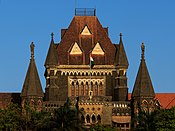High Courts Of India
The high courts of India are the highest courts of appellate jurisdiction in each state and union territory of India.
However, a high court exercises its original civil and criminal jurisdiction only if the subordinate courts are not authorized by law to try such matters for lack of peculiar or territorial jurisdiction. High courts may also enjoy original jurisdiction in certain matters, if so designated, especially by the constitution, a state law or union law.
| High Courts Of India | |
|---|---|
| Authorized by | Indian Constitution |
The work of most high courts primarily consists of appeals from lower courts and writ petitions in terms of Articles 226 and 227 of the Constitution. Writ jurisdiction is also the original jurisdiction of a high court.
Each state is divided into judicial districts presided over by a district judge and a session judge. He is known as the district judge when he presides over a civil case and the session's judge when he presides over a criminal case. He is the highest judicial authority below a high court judge. Below him, there are courts of civil jurisdiction, known by different names in different states. Under Article 141 of the constitution, all courts in India, including high courts – are bound by the judgements and orders of the Supreme Court of India by precedence.
Judges in a high court are appointed by the president of India in consultation with the chief justice of India and the governor of the state under Article 217, Chapter Five of Part VI of the Constitution, but through subsequent judicial interpretations, the primacy of the appointment process is on the hands of the Judicial Collegium. High courts are headed by a chief justice. The chief justices rank fourteenth (within their respective states) and seventeenth (outside their respective states) on the Indian order of precedence. The number of judges in a court is decided by dividing the average institution of main cases during the last five years by the national average, or the average rate of disposal of main cases per judge per year in that high court, whichever is higher.
The Calcutta High Court is the oldest high court in the country, established on 2 July 1862. High courts that handle numerous cases of a particular region have permanent benches established there. Benches are also present in states which come under the jurisdiction of a court outside its territorial limits. Smaller states with few cases may have circuit benches established. Circuit benches (known as circuit courts in some parts of the world) are temporary courts which hold proceedings for a few selected months in a year. Thus cases built up during this interim period are judged when the circuit court is in session. According to a study conducted by Bangalore-based N.G.O, Daksh, on 21 high courts in collaboration with the Ministry of Law and Justice in March 2015, it was found that average pendency of a case in high courts in India is 3 years.
The buildings of Bombay High Court (as part of the Victorian and art deco ensemble of Mumbai) and Punjab and Haryana High Court (as part of the architectural work of Le Corbusier) are UNESCO World Heritage Sites.
The high courts are substantially different from and should not be confused with the state courts of other federations, in that the Constitution of India includes detailed provisions for the uniform organisation and operation of all high courts. In other federations like the United States, state courts are formed under the constitutions of the separate states and as a result vary greatly from state to state.
High courts
The Calcutta High Court in Kolkata (est. 1862), Bombay High Court in Mumbai (est. 1862), Madras High Court in Chennai (est. 1862), Allahabad High Court in Allahabad (est. 1866), and Bangalore High Court in Bangalore (est. 1884) are the five oldest high courts in India. The Andhra High Court and Telangana High Court are the newest high courts, established on 1 January 2019 according to the Andhra Pradesh Reorganisation Act, 2014.
The following are the 25 high courts in India, sorted by name, year established, act by which it was established, jurisdiction, principal seat (headquarters), permanent benches (subordinate to the principal seat), circuit benches (functional a few days in a month/year), the maximum number of judges sanctioned, and the presiding chief justice of the high court:








